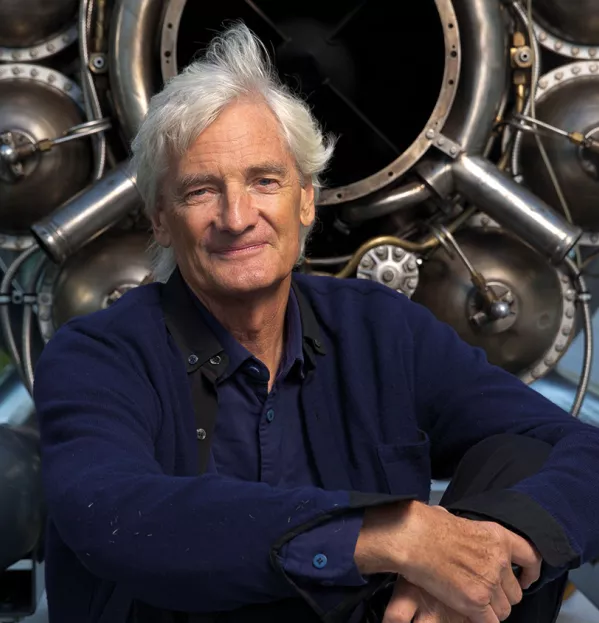Not enough engineers? Don’t worry, Dyson’s invented a fix

The Dyson Institute of Engineering and Technology in Wiltshire is, its founder is quick to say, no conventional education institution. And although the structure of its new course - which just opened to the first cohort of 33 school leavers this month - is similar to many of the new graduate-level apprenticeships encouraged by governments in Scotland and England, the billionaire backer insists it is very much a university.
The bachelor of engineering course will have its young students spending one day in conventional lectures and another in private study. But the remaining three days will be spent on rotation, as employees of inventor Sir James Dyson’s research, design and development team.
Similar to one of the new graduate-level apprenticeship schemes, the students are employees of the business and will be earning a salary throughout their four-year degree - starting at £15,500 a year and increasing annually. There is also the prospect of securing a graduate position with Dyson afterwards.
Sir James, who achieved fame and huge wealth after inventing his eponymous bagless vacuum cleaner, says the idea for the institute was born out of a meeting with Westminster universities minister Jo Johnson.
“I had gone to complain about there not being enough engineers,” says Sir James. “And he said, ‘Stop complaining and set up your own’, and I immediately said yes. We take on in excess of 100 new graduates a year [into the workplace] and mentor them, and we have what looks like a university campus here. If we can take on graduates and mentor them, why couldn’t we take on students?”
The reasons for not simply setting up a graduate-apprenticeship programme are clear. “We wanted to have our own university and do it in our own particular way,” he says. “We have something quite unique here. We have a very young workforce - the average age in our engineering department is 26. I also believe in [the value of] naïve intelligence rather than experience. This is a place where young people can come and contribute.”
‘Very much not an apprenticeship’
Duncan Piper, director of the Dyson Institute, adds that unlike an apprenticeship standard, the Dyson approach has not been set up by a group of employers. “This is not about a specific role that comes out of a new apprenticeship standard,” says Piper. “We are not trying to prepare them for a specific job; it is a degree preparing them for engineering more generally.”
The institute is trying to attract the most aspirational young people, “and they would not necessarily think about apprenticeships”. He adds: “It is very much not an apprenticeship - they will get a degree.”
But, equally, the institute is not a “normal” university either, says Sir James, who is the son of two school masters, and who is a governor at his old school. “Maybe universities teach what is conventional and of course we have to teach some of that, but I want the young people to think differently,” he says. “This is very much real life. What they do has to work.”
For its first term, which has just started, the institute received about 900 applications - despite a requirement for three A levels, including maths and an additional science or technology subject. “What we are doing is not an easy option,” stresses Sir James. “It is a 47-week year and they have to do their work with Dyson. It is also a four-year degree, not three [like most bachelor degree programmes in England]. But they also get two-and-a-half times the normal teaching time they would get at another university, and they are innovators. They will be contributing to our technology.”
The institute does not currently have degree-awarding powers - although it is hoped this will change in the coming years. For now, degrees will be awarded by WMG University of Warwick, which will also supply a number of lecturing staff for the first two years.
He says he has been worried about the shortage of engineers in the country for years, but is unsure what the reason for the lack of interest among young people is. “I wish I knew the answer,” he says. “We’ve just got it wrong. We have forgotten what makes us great. I hope that we can attract more young people into engineering by what we do.”
To tackle this, Sir James has set up the Dyson Foundation, with initiatives including free educational resources, scholarships and bursaries for engineering students, prototyping workshops, as well as support for schools to improve technology education.
The new institute will grow over the coming years, but Sir James insists it will remain small. “I think we are much more interested in quality than quantity,” he says. “It is important that Dyson can provide the highest quality. I mustn’t turn Dyson into a university rather than the technology company that it is.”
You need a Tes subscription to read this article
Subscribe now to read this article and get other subscriber-only content:
- Unlimited access to all Tes magazine content
- Exclusive subscriber-only stories
- Award-winning email newsletters
Already a subscriber? Log in
You need a subscription to read this article
Subscribe now to read this article and get other subscriber-only content, including:
- Unlimited access to all Tes magazine content
- Exclusive subscriber-only stories
- Award-winning email newsletters